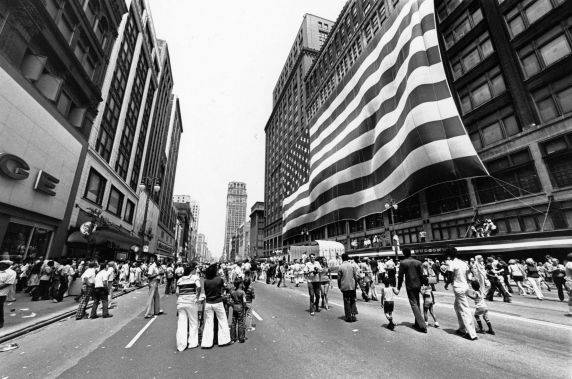From the ashes of Hudson’s, finally a phoenix for Detroit?
The demolition of Detroit’s downtown Hudson’s store in 1998 left scars both physical and psychic upon the beleaguered city. The loss of what had been a landmark for generations of shoppers was part of the pain, but the empty lot that took its place was another. Prime real-estate on Woodward Avenue stood vacant year after year.
So it’s no surprise that when Matt Cullen, president and CEO of Detroit’s Rock Ventures, dropped news of the site’s redevelopment in the middle of a roof-raising keynote at the Detroit Policy Conference last week, people took notice.
Cullen said the parcel was in the first stages of its re-emergence, with an “international design competition” planned for a mixed-use development of retail and residential on the old site. Coming in the midst of Cullen’s parade of positive news for the once-moribund city core, it quickly became the big story of the conference.
Cullen laid a carpet of upbeat facts about the Downtown and Midtown areas of the city. Residential units are at 97 percent occupancy, with major corporations pushing strong initiatives to get more employees moving there. And 65 new businesses downtown have made the area the “innovation hub” of the region, he said.
With such central city landmarks as the Madison, First National, Chase and Dime buildings (the latter rechristened the Chrysler House) at near or full capacity, the need for a new project in such a valuable location is obvious, Cullen added, announcing the site plans.
The site was given a 15-year extension on its Renaissance Zone designation in 2011, according to a Detroit News story, making any businesses within exempt from a wide range of taxes.
Cullen’s upbeat mood was matched by the next speaker on the program, urban expert Richard Florida, who told conference attendees that “10 years ago, I wouldn’t have said (Detroit’s core rebirth) was possible.”
Florida touted cities, especially walkable, bike-able ones with dense urban centers, as necessary for the sort of “creative-class” employment that will move the 21st-century economy. He said 40 million Americans already have creative-class jobs, and that during the Great Recession, their unemployment rate never topped 5 percent.
Referring to author Thomas Friedman’s premise that “the world is flat” -- i.e., more susceptible to the economic pressures of globalization -- Florida objected to the idea that distance doesn’t matter anymore. There’s a creative energy that exists in cities, he said, and they must be preserved.
“And this city-suburb thing has to go away,” Florida said.
Staff Writer Nancy Nall Derringer has been a writer, editor and teacher in Metro Detroit for seven years, and was a co-founder and editor of GrossePointeToday.com, an early experiment in hyperlocal journalism. Before that, she worked for 20 years in Fort Wayne, Indiana, where she won numerous state and national awards for her work as a columnist for The News-Sentinel.
Business Watch
Covering the intersection of business and policy, and informing Michigan employers and workers on the long road back from coronavirus.
- About Business Watch
- Subscribe
- Share tips and questions with Bridge Business Editor Paula Gardner
Thanks to our Business Watch sponsors.
Support Bridge's nonprofit civic journalism. Donate today.
See what new members are saying about why they donated to Bridge Michigan:
- “In order for this information to be accurate and unbiased it must be underwritten by its readers, not by special interests.” - Larry S.
- “Not many other media sources report on the topics Bridge does.” - Susan B.
- “Your journalism is outstanding and rare these days.” - Mark S.
If you want to ensure the future of nonpartisan, nonprofit Michigan journalism, please become a member today. You, too, will be asked why you donated and maybe we'll feature your quote next time!


 NEW LIFE FOR SITE?: The J.L. Hudson store’s enormous flag was unfurled on its Woodward Avenue facade on Flag Day 1976. The banner, called the world’s largest at the time, now rests in the Smithsonian Institution in Washington, D.C. At a policy conference in Detroit last week, Matt Cullen of Rock Ventures announced a proposal to redevelop the former Hudson’s location. (Photo courtesy of the Tony Spina collection: Walter P. Reuther Library, Wayne State University)
NEW LIFE FOR SITE?: The J.L. Hudson store’s enormous flag was unfurled on its Woodward Avenue facade on Flag Day 1976. The banner, called the world’s largest at the time, now rests in the Smithsonian Institution in Washington, D.C. At a policy conference in Detroit last week, Matt Cullen of Rock Ventures announced a proposal to redevelop the former Hudson’s location. (Photo courtesy of the Tony Spina collection: Walter P. Reuther Library, Wayne State University)